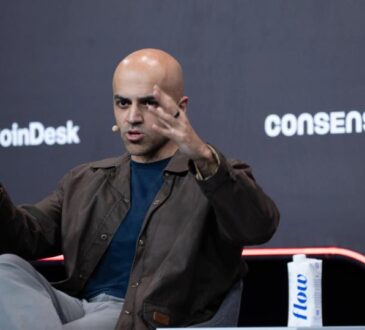
Venture capital in Baltimore saw a modest uptick last quarter, though overall investment levels remain subdued.
Baltimore companies raised $95.7 million across 10 deals in the third quarter of this year — with just two deals accounting for more than half of the cash — according to the latest Venture Monitor report, released quarterly by PitchBook and the National Venture Capital Association.
“Entities like Fulton Bank or other major companies are going to have to start contributing more if we want to see this innovation continue.”
Bret Schreiber, senior vice president of life sciences and technology at Fulton Bank
It’s about a 5% increase from the previous quarter’s $90.9 million across 21 deals. While total investment is up, the smaller number of deals signals ongoing market instability, according to Bret Schreiber, senior vice president of life sciences and technology at Fulton Bank.
“The fewer deals reflect a cautiousness from VCs and private equity and angels that I’m hearing across the marketplace,” Schreiber told Technical.ly.
Biotech firms Rapafusyn Pharmaceuticals and Noxilizer secured $44 million and $30 million, respectively, while the next biggest deal was just a fraction of that at $10 million.
Across the rest of the state, it’s a similar story, with large deals inflating totals. Maryland overall raised just over $1 billion in Q3, driven by a $779 million mega deal from X-energy, a nuclear energy company. The deal, announced in February, appears to have closed in July, according to an SEC filing.
Most of the remaining funding last quarter went to healthcare companies.
New federal priorities affect key Maryland sectors
Overall, this year has slowed compared to last year in Baltimore, following a national downward trend since the VC peak in 2021.
A decline in federal funding is at least partially responsible for the VC slowdown. At Fulton Bank, for example, the company usually invests in businesses that have already received Small Business Innovation Research grants or other early venture support, not first-round capital, according to Schreiber.
“When you see a lack of federal funds going out, and early-stage venture firms or angel investors who aren’t deploying dollars, that also makes it difficult for us to deploy dollars,” Schreiber said.
Fewer federal awards under the Trump administration are expected to hit one of Maryland’s key industries, biotech, hard. The uncertainty, plus rhetoric questioning vaccine effectiveness, causes companies to delay or scale back public listings, according to PitchBook analysts, resulting in a sharp decline in venture-backed biotech IPOs. Just eight companies have gone public so far in 2025, compared to 22 at the same point last year.
Schreiber added that the downturn in overall VC investment since 2022 has also limited biotech companies’ ability to go public. With lengthy clinical trials and Food and Drug Administration approval processes, the reduced funding that began in 2022 aligns with the current decline in IPOs.
“It’s been almost four years now of declining funding, which makes it more difficult for these biotech and life sciences companies to get to and pass FDA approval and go public,” Schreiber said.
Founders look for opportunities outside VC
Companies need VC to offset federal dips, but it’ll take a shift in mindset from private backers.
Instability between administrations’ economic development policies underscores the need for the private sector to take the lead in investment and rely less on federal funding, according to Schreiber.
“The state needs to start thinking differently,” Schreiber said. “Corporate America, entities like Fulton Bank or other major companies, are going to have to start contributing more if we want to see this innovation continue.”
Some companies have given up on VC completely. The CEO of PerVista AI, Vennard Wright, largely stopped pursuing VC after little success attracting interest beyond the public sector, he said.
Plus, despite the AI funding boom, Black founders often haven’t shared in the gains. A 2024 Crunchbase report found that startup funding for companies with Black founders hit a multiyear low last year, even as overall investment saw a slight increase.
Wright eventually found money outside traditional fundraising. Wright secured a $200,000 Pre-Seed Builder Fund investment from the Maryland Technology Development Corporation, the state’s venture arm, and later won $250,000 on the reality show America’s Real Deal, where founders compete for funding.
Recently, Wright has focused more on generating revenue by acquiring new customers than on raising funds in a tight market.
“It’s tough for certain founders to get investment in the AI industry,” Wright said. “I have to spend a lot of time building up my credibility with people.”




